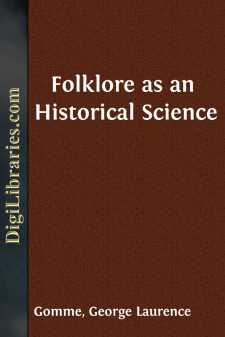Categories
- Antiques & Collectibles 13
- Architecture 36
- Art 48
- Bibles 22
- Biography & Autobiography 813
- Body, Mind & Spirit 142
- Business & Economics 28
- Children's Books 17
- Children's Fiction 14
- Computers 4
- Cooking 94
- Crafts & Hobbies 4
- Drama 346
- Education 46
- Family & Relationships 57
- Fiction 11829
- Games 19
- Gardening 17
- Health & Fitness 34
- History 1377
- House & Home 1
- Humor 147
- Juvenile Fiction 1873
- Juvenile Nonfiction 202
- Language Arts & Disciplines 88
- Law 16
- Literary Collections 686
- Literary Criticism 179
- Mathematics 13
- Medical 41
- Music 40
- Nature 179
- Non-Classifiable 1768
- Performing Arts 7
- Periodicals 1453
- Philosophy 64
- Photography 2
- Poetry 896
- Political Science 203
- Psychology 42
- Reference 154
- Religion 513
- Science 126
- Self-Help 84
- Social Science 81
- Sports & Recreation 34
- Study Aids 3
- Technology & Engineering 59
- Transportation 23
- Travel 463
- True Crime 29
Folklore as an Historical Science
Categories:
Description:
Excerpt
PREFACE
If I have essayed to do in this book what should have been done by one of the masters of the science of folklore—Mr. Frazer, Mr. Lang, Mr. Hartland, Mr. Clodd, Sir John Rhys, and others—I hope it will not be put down to any feelings of self-sufficiency on my part. I have greatly dared because no one of them has accomplished, and I have so acted because I feel the necessity of some guidance in these matters, and more particularly at the present stage of inquiry into the early history of man.
I have thought I could give somewhat of that guidance because of my comprehension of its need, for the comprehension of a need is sometimes half-way towards supplying the need. My profound belief in the value of folklore as perhaps the only means of discovering the earliest stages of the psychological, religious, social, and political history of modern man has also entered into my reason for the attempt.
Many years ago I suggested the necessity for guidance, and I sketched out a few of the points involved (Folklore Journal, ii. 285, 347; iii. 1-16) in what was afterwards called by a friendly critic a sort of grammar of folklore. The science of folklore has advanced far since 1885 however, and not only new problems but new ranges of thought have gathered round it. Still, the claims of folklore as a definite section of historical material remain not only unrecognised but unstated, and as long as this is so the lesser writers on folklore will go on working in wrong directions and producing much mischief, and the historian will judge of folklore by the criteria presented by these writers—will judge wrongly and will neglect folklore accordingly.
I hope this book may tend to correct this state of things to some extent. It is not easy to write on such a subject in a limited space, and it is difficult to avoid being somewhat severely technical at points. These demerits will, I am sure, be forgiven when considered by the light of the human interest involved.
All studies of this kind must begin from the standpoint of a definite culture area, and I have chosen our own country for the purpose of this inquiry. This will make the illustrations more interesting to the English reader; but it must be borne in mind that the same process could be repeated for other areas if my estimate of the position is even tolerably accurate. For the purpose of this estimate it was necessary, in the first place, to show how pure history was intimately related to folklore at many stages, and yet how this relationship had been ignored by both historian and folklorist. The research for this purpose had necessarily to deal with much detail, and to introduce fresh elements of research. There is thus produced a somewhat unequal treatment; for when illustrations have to be worked out at length, because they appear for the first time, the mind is apt to wander from the main point at issue and to become lost in the subordinate issue arising from the working out of the chosen illustration. This, I fear, is inevitable in folklore research, and I can only hope I have overcome some of the difficulties caused thereby in a fairly satisfactory manner....


